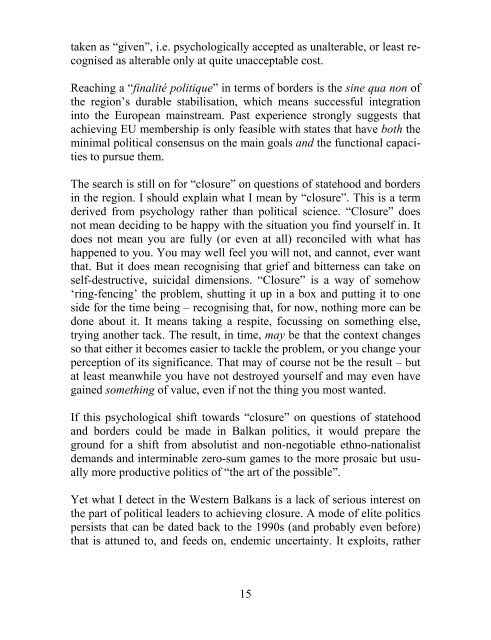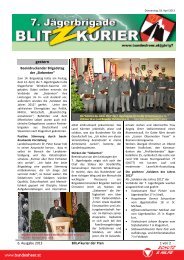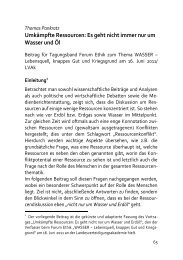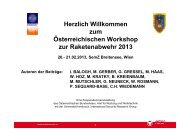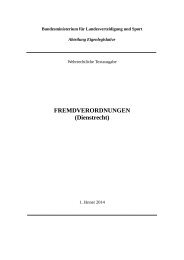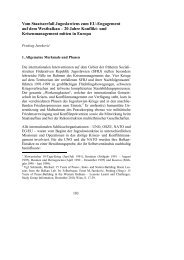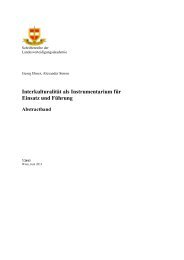Cutting or Tightening the Gordian Knot
Cutting or Tightening the Gordian Knot
Cutting or Tightening the Gordian Knot
Create successful ePaper yourself
Turn your PDF publications into a flip-book with our unique Google optimized e-Paper software.
taken as “given”, i.e. psychologically accepted as unalterable, <strong>or</strong> least recognised<br />
as alterable only at quite unacceptable cost.<br />
Reaching a “finalité politique” in terms of b<strong>or</strong>ders is <strong>the</strong> sine qua non of<br />
<strong>the</strong> region’s durable stabilisation, which means successful integration<br />
into <strong>the</strong> European mainstream. Past experience strongly suggests that<br />
achieving EU membership is only feasible with states that have both <strong>the</strong><br />
minimal political consensus on <strong>the</strong> main goals and <strong>the</strong> functional capacities<br />
to pursue <strong>the</strong>m.<br />
The search is still on f<strong>or</strong> “closure” on questions of statehood and b<strong>or</strong>ders<br />
in <strong>the</strong> region. I should explain what I mean by “closure”. This is a term<br />
derived from psychology ra<strong>the</strong>r than political science. “Closure” does<br />
not mean deciding to be happy with <strong>the</strong> situation you find yourself in. It<br />
does not mean you are fully (<strong>or</strong> even at all) reconciled with what has<br />
happened to you. You may well feel you will not, and cannot, ever want<br />
that. But it does mean recognising that grief and bitterness can take on<br />
self-destructive, suicidal dimensions. “Closure” is a way of somehow<br />
‘ring-fencing’ <strong>the</strong> problem, shutting it up in a box and putting it to one<br />
side f<strong>or</strong> <strong>the</strong> time being – recognising that, f<strong>or</strong> now, nothing m<strong>or</strong>e can be<br />
done about it. It means taking a respite, focussing on something else,<br />
trying ano<strong>the</strong>r tack. The result, in time, may be that <strong>the</strong> context changes<br />
so that ei<strong>the</strong>r it becomes easier to tackle <strong>the</strong> problem, <strong>or</strong> you change your<br />
perception of its significance. That may of course not be <strong>the</strong> result – but<br />
at least meanwhile you have not destroyed yourself and may even have<br />
gained something of value, even if not <strong>the</strong> thing you most wanted.<br />
If this psychological shift towards “closure” on questions of statehood<br />
and b<strong>or</strong>ders could be made in Balkan politics, it would prepare <strong>the</strong><br />
ground f<strong>or</strong> a shift from absolutist and non-negotiable ethno-nationalist<br />
demands and interminable zero-sum games to <strong>the</strong> m<strong>or</strong>e prosaic but usually<br />
m<strong>or</strong>e productive politics of “<strong>the</strong> art of <strong>the</strong> possible”.<br />
Yet what I detect in <strong>the</strong> Western Balkans is a lack of serious interest on<br />
<strong>the</strong> part of political leaders to achieving closure. A mode of elite politics<br />
persists that can be dated back to <strong>the</strong> 1990s (and probably even bef<strong>or</strong>e)<br />
that is attuned to, and feeds on, endemic uncertainty. It exploits, ra<strong>the</strong>r<br />
15


